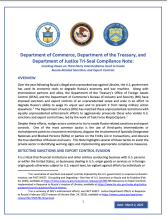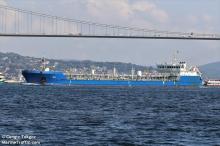Russia
After the announcement on August 1, 2024, of a significant multilateral prisoner exchange between Russia and the United States, most of the coverage of the deal has focused on the return of the U.S. citizens and of an apparent FSB assassin to Russia.
Drones have played a key role on both sides in the conflict in Ukraine. While much attention has focused on Ukraine’s acquisition of UAVs from Turkey and Russia’s reliance on Iranian UAVs, less has been said about how small, mass market drones have been procured from the commercial market. Da-Jiang Innovations (DJI), a Chinese mass producer of quadcopters and one of the world’s leading companies in quadcopters, has seen its products become ubiquitous as Ukrainian and Russian forces fight trench-by-trench for control of the country.
- Read more about Russia’s Quadcopter Express
- Log in to post comments
The US Department of Commerce's Bureau of Industry and Security (BIS), the Department of the Treasury's Office of Foreign Asset Control (OFAC), and the Department of Justice have issued a joint compliance note on the use of third-party intermediaries or transshipment points to evade Russian and Belarusian-related sanctions and export controls. The note highlights the most common tactics used to evade these controls and provides guidance to companies on how to maintain an effective, risk-based sanctions and export compliance program.
- Read more about US Advisory on Russian Sanctions Evasion
- Log in to post comments
A Russian Orlan-10 drone captured by Ukrainian troops contained a Xilinx brand semiconductor in the drone's targeting system. The image taken of the drone was clear enough to show the product line and other identifying markers such as its place of manufacture. Using trade data, CNS researchers gathered import data on all imports of Xilinx brand products to Russia from the time period of January 2017 to October 2021.
Pavel Flider is a Russian émigré and naturalized American citizen who allegedly used his California company Trident International to transship advanced electronics to the Russian Federation. According to court documents, Flider did this using a series of fronts located in Estonia and Finland. The scheme was caught when U.S.
Tsvetan Kanev was less successful than Brazhnikov and his son, as detailed in Case Study 19. Tsvetan Kanev was indicted for violation of the International emergency Economic Powers Act and unlawful smuggling after he attempted to buy clock drivers and other controlled items and send them to Russia without a license. Mr. Kanev’s scheme fell apart when an attempt by Mr.
Alexander Brazhnikov Sr. was indicted after he allegedly moved an estimated $65 million in electronics from the United States to the Russian Federation from 2008 to 2014.[1] His customers allegedly included the Russian military, internal security services, and VNIIEF,[2] the latter of which is one of Russia’s most important nuclear weapons entities.
“The sanctions they applied on myself, on my companies and on my friends are absolutely unfair, absolutely fake and absolutely wrong” 48-year-old Ilias Sabirov told Reuters after allegedly caught selling radiation hardened chips to Russia without a license.[1] Radiation hardened chips, which require an export license due to their military uses, are one of the more sought-
INTRODUCTION
In December 2021, a Danish court fined and convicted the Dan Bunkering shipping firm and its parent company, Bunker Holdings, millions for dollars and gave a four-month suspended prison to the company’s CEO over a European Union sanctions-busting scheme.[1] The company was convicted of selling jet fuel to Russian companies, which in turn transferred the fuel on to Syria in contravention of EU sanctions. The company, which is the largest bunker supplier in the world, is alleged to have made 33 sales of jet fuel worth $102 million between 2015 and 2017.[2]



